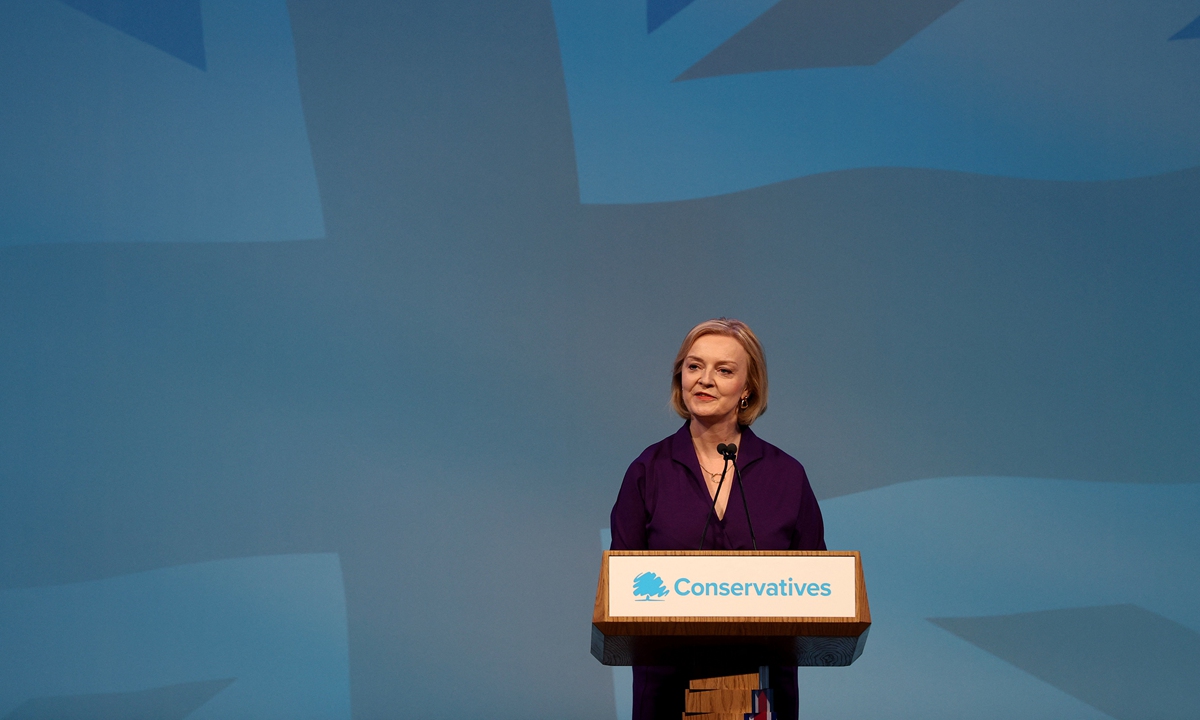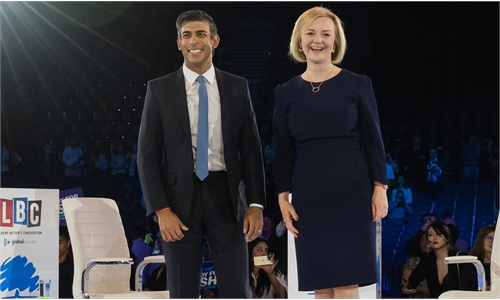Liz Truss elected UK's new PM, faces tough job amid huge mess; 'pragmatic China ties crucial to overcome challenge'

New Conservative Party leader and Britain's Prime Minister-elect Liz Truss delivers a speech at an event to announce the winner of the Conservative Party leadership contest in central London on September 5, 2022. Photo: AFP
Liz Truss will move in 10 Downing Street as she beat Rishi Sunak in the election on Monday to become the new leader of the Conservative Party and the new UK Prime Minister. Analysts believed that this would be a tough job for her as Britain is now facing complicated and serious internal and external challenges, such as inflation and the problem caused by the Russia-Ukraine conflict.
Truss officially won the Conservative Party leadership race on Monday, and according to the announced results, Truss won 81,326 votes compared to Sunak's share of 60,399 votes. There was a turnout of 82.6 percent in this election, BBC reported.
Truss thanked her controversial predecessor Boris Johnson in her speech after the result was announced. She praised Johnson of "getting Brexit done" and being tough toward Russia, according to the BBC report.
Observers believed the remarks show that she will continue Johnson's policies in foreign affairs, and it's possible she will take more radical and tougher actions in handling ties with the EU, Russia and China.
Truss will formally become the new prime minister of the UK on Tuesday when she visits the Queen in Balmoral for an invitation to form her UK government, the report said.
Some Chinese experts are concerned that Truss, who lacks experience and capability in governance, will bring huge uncertainty to future policymaking, and China-UK relations will also be impacted, stressing that stable and pragmatic ties with China are crucial for the UK to overcome challenges, and if the new government unwisely pushes further decoupling with China to please the US, it will only make the UK's mess even worse.
Huge mess
On Friday, three days ahead of the announcement of the new UK prime minister, Britain dropped behind India to become the world's sixth largest economy, according to GDP figures from the International Monetary Fund.
The former British colony leaped past the UK in the final three months of 2021 to become the fifth-biggest economy. The calculation is based in US dollars, and India extended its lead in the first quarter. The UK's decline in the international rankings is an unwelcome backdrop for the new prime minister, Bloomberg reported.
Chinese analysts said that Britain being surpassed by its former colony in terms of economy is a symbolic incident that proves the UK is declining badly and being further marginalized in Europe. This also shows that London's policy that closely follows US', to serve Washington's strategy in dealing with other major powers like the EU, Russia and China, is bringing no concrete benefit to Britain, and it also can't stop the UK's post-Brexit mess from worsening.
Truss is likely to face the most challenging set of circumstances of any prime minister since Margaret Thatcher, said the Times on Monday. The biggest issue for the new prime minister is the cost of living crisis and Truss looks set to respond by ripping up 20 years of economic orthodoxy.
Soaring inflation, energy bills and the price of food have prompted warnings of households going cold and hungry this winter, said the Times report.
The current unprecedented shambles resulted from a series of negative incidents including Brexit, the COVID-19 pandemic and the Ukraine crisis and are extremely challenging for any new leader to solve, Wang Shuo, a professor at the School of International Relations of Beijing Foreign Studies University, told the Global Times on Monday.
Wang said Truss' hawkish language on China during the campaign came from the fact that Truss perfectly knew that she is not capable to solve UK's domestic problems such as inflation or the energy crisis.
"Shirking one's responsibility is the simplest and most effective way for an incompetent politician. By blaming and criticizing China and Russia harshly, just as what Truss always does, it is actually saying: All the problems we have in the UK are the fault of China and Russia instead of the inability of the country's governors," Wang pointed out.
Yin Zhiguang, a professor at the School of International Relations and Public Affairs under Fudan University, told the Global Times on Monday that the Conservative Party is impossible to review or reform the current development model, so the new prime minister will likely use political approaches to solve economic problems.
"Truss' idea of tax cut is actually unrealistic, especially when the economy is declining under multiple challenges like inflation and energy crisis. How to get money will be the key problem for the new government," Yin said.
Apart from seeking opportunities from involving in the Russia-Ukraine conflict, London would further strengthen the trans-Atlantic alliance with the US, to seek possibilities of solving economic problems from making the UK a stronghold for Washington to involve the issues in Europe and Asia, Yin said.
Uncertain future
Based on the difficulties that the UK is facing now and the performance of Truss in the past when she served in other positions in the British government, the international community, whether in the Western or non-Western world, share concerns over the change she could bring to the UK.
US media Politico said earlier on August 23 that "More than a dozen conversations with senior diplomats and insiders from power centers around the world suggest Truss is not exactly a popular choice on the global stage."
Truss will be met with deep skepticism across much of Western Europe, and within the Biden administration, because her stance in handling post-Brexit trade ties with Europe and her sponsorship of the Northern Ireland Protocol Bill could impact the hard-won peace in Ireland, said Politico.
China is also concerned about the potential changes that might be brought by the new UK government, since Truss could appoint some extreme anti-China politicians to handle foreign affairs and national security, so under pressure from the US, London could be more assertive in decoupling with China, and use Hong Kong or Xinjiang as pretexts to suspend or cut off existing cooperation, Yin said.
If a hostile policy toward China has been implemented by Truss, it serves the interest of Truss herself rather than the UK, Cui Hongjian, director of the Department of European Studies at the China Institute of International Studies, told the Global Times on Monday.
In order to please not only Washington, but also the sick political correctness of anti-China and anti-Russia stance spreading across the Western world, "Truss is very likely to politically and diplomatically take a tough stance toward China in the short term due to her dubious governing capacity," Cui said.
"But in the long run, after some frictions, Truss may learn to be pragmatic and return to a balanced position, just as what her predecessors Theresa May and Boris Johnson did in handling ties with China - being tough on diplomatic and political fronts but maintaining trade and economic cooperation," Cui noted.
Wang echoed that "as long as doing business with China can bring benefits to the capitalists of the UK, the country's cooperation with China will be unstoppable. So the key is not about whether UK politicians like China or not, it's about whether the cooperation is beneficial."


